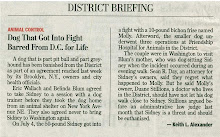We thought that we would post a recent editorial from the NY Times by the elegant VERLYN KLINKENBORG, "Should Most Pet Owners Be Required to Neuter Their Animals?" because of its profound meaning to the current case. Sidney was a mutt rescued from the streets of the Bronx by Belinda and not purchased as a designer dog , and the first thing she did was to take him in to get him neutered. Now, the city wants to reward her for her responsibility by trying him under the Dangerous Dog Act for defending his space. Something is terribly wrong here, and that's why we started this blog. Maybe there are things we do not know, but I doubt it. As Edmund Burke said, "Evil happens when good people do nothing." (And, conversely, as we say, "Good things happen when evil people do nothing.")
Here's VERLYN KLINKENBORG's New York Times editorial of July 30, 2007:
Recently a controversial bill — Assembly Bill 1634 — was withdrawn from a committee of the California State Senate by its sponsor, Assemblyman Lloyd Levine, a Democrat from Van Nuys. The bill would have required the mandatory spaying or neutering of all cats and dogs, applying statewide the kind of regulations that have already been enacted in some cities across the country.
In its various drafts, Mr. Levine softened the basic provisions of the bill, changing the mandatory age of compliance from 4 months old to 6 months, allowing even later compliance if it was recommended by a veterinarian, and adding an amendment that would let local agencies issue “one litter” permits for the family pet. The bill would also have required breeders to obtain an “intact animal permit.”
None of these changes satisfied the bill’s main opponent, the American Kennel Club. The A.K.C. argues that this bill threatens “the right to own and breed dogs responsibly.” In fact, what the bill attacks is the habit of breeding dogs and cats irresponsibly.
In California last year, 450,000 cats and dogs were euthanized. The real thrust of the A.K.C.’s argument is economic. Dog fanciers have been reluctant to bring their animals to dog shows in municipalities with mandatory spaying and neutering laws. The trump card politically? Loss of local and state revenue.
There may be better ways than a statewide law to reduce the number of unwanted pets. But the opponents of mandatory neutering make it sound as though the problem can be solved mainly by teaching owners to spay or neuter their pets voluntarily. That might be true, if we thought more rationally about our pets. But keeping pets isn’t about rationality. When it comes to them, Americans are lost in a seemingly endless act of transference.
It’s apparent in the obesity of our dogs and cats, and in our increasing spending on veterinary care and gourmet pet food and dietary supplements and everything else that helps us treat them as our superconsumerist equals.
This transference extends to how we think about the sexuality of our pets, which is, all too often, a projection of our own.
Many owners feel a sense of implicit posterity, a kind of family-values virtue — think a litter of kittens in a warm corner of the kitchen — in the reproductive potential of their pets.
Others feel what, in America, is an even more basic emotion, the conviction that they have an absolute right to do with their property exactly as they like. But too often the result is the same: another cat joins the enormous tribe of feral cats, whose effect on the bird population is catastrophic, and another dog finds itself in jail awaiting execution.
For humans, these are deep psychological waters. We expect to find as much innocence in our pets as we do in newborn children, which may be one reason why so few older pets are adopted from shelters.
We want the pleasures of neoteny — the adorable sustained appearance of infancy — in part because it helps us forget how much responsibility is involved in owning and training a dog.
Americans are consumers of pets just as we are consumers of everything else. We expect gratification without responsibility. We see only the easy pleasure, not the work. The rate at which dogs are purchased and euthanized in this country is not a sign of our affection for them. It’s a sign of our indifference.
Subscribe to:
Post Comments (Atom)


No comments:
Post a Comment